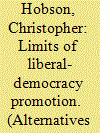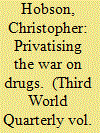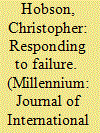|
|
|
Sort Order |
|
|
|
Items / Page
|
|
|
|
|
|
|
| Srl | Item |
| 1 |
ID:
154913


|
|
|
|
|
| Summary/Abstract |
When work on the democratic peace first emerged it contributed to the revitalization of liberal thought and represented an important contribution to International Relations (IR). Yet innovation has been replaced by stagnation. Coding and correlation are debated ad infinitum, while little attention is given to growing economic inequality, voter alienation, a decline in traditional parties, rising populism and a wide array of related trends that raise serious doubts about the health of democracies at the center of the zone of peace. Yet if democratic institutions are not functioning as they are meant to, and norms of compromise are disappearing domestically, what hope can there be that these will facilitate cooperative behavior between democracies? Rather than promoting peace, could it be that capitalism in its contemporary neoliberal form is undermining or hollowing out democracy? The static understanding of democracy adopted by this research means that such questions have been largely overlooked. In response, I focus on two major changes impacting established democracies and consider their significance for democratic peace arguments: the decline of democratic institutions and culture, as well as how neoliberalism is reshaping the relationship between democracy and capitalism. In developing this argument, I propose that the template that the democratic peace research program offers for studying the world is emblematic of—and contributing to—a troubling contracting of our political vision. An excessive concern with methodological rigor, combined with a narrow understanding of what qualifies as valid research, has resulted in a body of scholarship that is remarkably sophisticated but has surprisingly little to say about democracy and its place in the world.
|
|
|
|
|
|
|
|
|
|
|
|
|
|
|
|
| 2 |
ID:
192076


|
|
|
|
|
| Summary/Abstract |
The COVID-19 pandemic poses fundamental challenges to the ways that the discipline of International Relations makes sense of our world. Framing the pandemic as both a social disaster and as part of an ongoing polycrisis, this work argues that existing responses to COVID-19 are, whatever their insights, partial and limited, predicated on assumptions about how we know the world now shown to be problematic. This situation calls less for some defined incremental change and more for a period of uncomfortable disciplinary reflection on the boundaries, purposes and value structures that shape IR.
|
|
|
|
|
|
|
|
|
|
|
|
|
|
|
|
| 3 |
ID:
060679


|
|
|
|
|
| Publication |
Mar 2005.
|
| Summary/Abstract |
Following the 11 September terrorist attacks, a belief has emerged that one of the root causes of Islamic extremism lies in the repressive nature of the regimes that populate the Middle East. Thus the spread of democracy has become a major component of the Bush administration's 'war on terror' Previously dismissed as Wilsonian idealism, the promotion of democracy is now considered a strategic necessity to address the threat posed by terrorism. Despite the significant role democracy promotion has played in the present foreign policy of the United States, the focus has tended to be on the more controversial policies of preventive warfare and coalitions of the willing. The purpose of this article is to help rectify this imbalance by examining the role the promotion of democracy plays within the current administration's foreign policy in the Middle East. It considers the logic behind America's 'forward strategy of freedom' in the Middle East as well as the likelihood of this strategy succeeding.
|
|
|
|
|
|
|
|
|
|
|
|
|
|
|
|
| 4 |
ID:
094317


|
|
|
|
|
| Publication |
2009.
|
| Summary/Abstract |
One of the few unambiguously positive outcomes of the George W. Bush years is a greater interest in the practice of democracy promotion. However, the expansion of scholarship in this area has not been matched by an equal expansion in its scope. There continues to be an overwhelming tendency to focus exclusively on empirical case studies and policy prescriptions, usually informed by a set of unstated liberal assumptions. Nothing is necessarily wrong with this per se. The problem stems from the lack of attention directed toward the larger theoretical and conceptual frameworks that inform and shape these practices. Responding to this state of affairs, this article examines the way certain theoretical tendencies and commitments have helped give rise to many problematic aspects of liberal democracy promotion. It is necessary to challenge the restrictive framework that currently dominates. It is argued that to do so entails rethinking, extending, and pluralizing the way democracy itself is conceived.
|
|
|
|
|
|
|
|
|
|
|
|
|
|
|
|
| 5 |
ID:
134402


|
|
|
|
|
| Summary/Abstract |
A defining feature of the ‘9/11 wars’ has been the prominent role played by private military and security companies (pmsc). The growth of this market for military and security services has not gone unnoticed. Yet the role pmsc have played in supporting the US-led war on drugs has largely gone under the radar, both literally and figuratively. The aim of this article is to look at the activities of pmsc funded by the USA in Latin America, and to consider the specific consequences that arise from employing them in the field of counter-narcotics. It is argued that the use of pmsc further entrenches a costly and unsuccessful way of dealing with drugs. There is a need to move from a strict prohibitionist stance and consider alternatives to the war on drugs approach, but the use of pmsc creates another strong vested interest in maintaining an increasingly problematic and costly status quo.
|
|
|
|
|
|
|
|
|
|
|
|
|
|
|
|
| 6 |
ID:
145981


|
|
|
|
|
| Summary/Abstract |
During its first decade in existence, the Responsibility to Protect (R2P) doctrine has struggled to transcend the complexities that plague humanitarian action. This article examines the political challenges that shape the practice of R2P, as well as the discourse that informs it. It reflects on the constant presence of failure that haunts humanitarian intervention, and argues for a more humble stance on what is possible in such situations. Humility entails meditating on human limits, both physical and mental, which serves as an important guide in determining action. It promotes a more chastened position; one that acknowledges that right intentions might not lead to just outcomes, that there are real limits on the ability of external actors to understand or control events during and following an intervention, and that our ability to comprehend such complex situations should warn against premature judgements and confident conclusions. And when failure occurs, it means not denying or avoiding it, but facing it squarely and reckoning with the consequences. The value of adopting a more humble approach will be considered through examining the 2011 Libyan intervention, a significant case for the R2P doctrine. There, success appears to have been exchanged for failure, leaving challenging and unresolved questions about what this experience means for Libya and R2P.
|
|
|
|
|
|
|
|
|
|
|
|
|
|
|
|
| 7 |
ID:
114993


|
|
|
|
|
| Publication |
2011.
|
| Summary/Abstract |
The Democratic Peace research programme remains a prominent and influential strand of International Relations theory. It occupies a central place in the discipline, both as a dominant version of liberal internationalism, and as a supposedly paradigmatic case demonstrating the strengths of positivist scholarship. Nonetheless, Democratic Peace scholarship has been challenged by recent real world events, notably the belligerent behaviour of democratic states during the so-called 'War on Terror', and the use of its findings to justify the US led invasion of Iraq. In this regard, Democratic Peace research has struggled to deal with the ethical and practical consequences of its work, as the focus has been on empirically observable and testable problems that fit within the remit of positivist social scientific practice. Responding to this state of affairs, it is argued here that there is a pressing need to further extend and pluralise existing scholarship by incorporating approaches which commence from different ontological, epistemological and methodological starting points. While there are multiple possibilities, Frankfurt School Critical Theory has great potential to contribute to an expanded research agenda. The article outlines what a Critical Theory approach to the study of Democratic Peace would entail, highlighting the substantial contribution it can make.
|
|
|
|
|
|
|
|
|
|
|
|
|
|
|
|
|
|
|
|
|